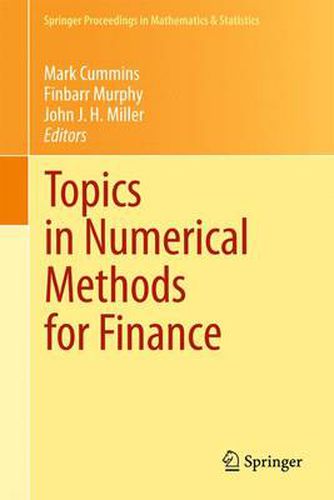Readings Newsletter
Become a Readings Member to make your shopping experience even easier.
Sign in or sign up for free!
You’re not far away from qualifying for FREE standard shipping within Australia
You’ve qualified for FREE standard shipping within Australia
The cart is loading…






This title is printed to order. This book may have been self-published. If so, we cannot guarantee the quality of the content. In the main most books will have gone through the editing process however some may not. We therefore suggest that you be aware of this before ordering this book. If in doubt check either the author or publisher’s details as we are unable to accept any returns unless they are faulty. Please contact us if you have any questions.
Presenting state-of-the-art methods in the area, the book begins with a presentation of weak discrete time approximations of jump-diffusion stochastic differential equations for derivatives pricing and risk measurement. Using a moving least squares reconstruction, a numerical approach is then developed that allows for the construction of arbitrage-free surfaces. Free boundary problems are considered next, with particular focus on stochastic impulse control problems that arise when the cost of control includes a fixed cost, common in financial applications. The text proceeds with the development of a fear index based on equity option surfaces, allowing for the measurement of overall fear levels in the market. The problem of American option pricing is considered next, applying simulation methods combined with regression techniques and discussing convergence properties. Changing focus to integral transform methods, a variety of option pricing problems are considered. The COS method is practically applied for the pricing of options under uncertain volatility, a method developed by the authors that relies on the dynamic programming principle and Fourier cosine series expansions. Efficient approximation methods are next developed for the application of the fast Fourier transform for option pricing under multifactor affine models with stochastic volatility and jumps. Following this, fast and accurate pricing techniques are showcased for the pricing of credit derivative contracts with discrete monitoring based on the Wiener-Hopf factorisation. With an energy theme, a recombining pentanomial lattice is developed for the pricing of gas swing contracts under regime switching dynamics. The book concludes with a linear and nonlinear review of the arbitrage-free parity theory for the CDS and bond markets.
$9.00 standard shipping within Australia
FREE standard shipping within Australia for orders over $100.00
Express & International shipping calculated at checkout
This title is printed to order. This book may have been self-published. If so, we cannot guarantee the quality of the content. In the main most books will have gone through the editing process however some may not. We therefore suggest that you be aware of this before ordering this book. If in doubt check either the author or publisher’s details as we are unable to accept any returns unless they are faulty. Please contact us if you have any questions.
Presenting state-of-the-art methods in the area, the book begins with a presentation of weak discrete time approximations of jump-diffusion stochastic differential equations for derivatives pricing and risk measurement. Using a moving least squares reconstruction, a numerical approach is then developed that allows for the construction of arbitrage-free surfaces. Free boundary problems are considered next, with particular focus on stochastic impulse control problems that arise when the cost of control includes a fixed cost, common in financial applications. The text proceeds with the development of a fear index based on equity option surfaces, allowing for the measurement of overall fear levels in the market. The problem of American option pricing is considered next, applying simulation methods combined with regression techniques and discussing convergence properties. Changing focus to integral transform methods, a variety of option pricing problems are considered. The COS method is practically applied for the pricing of options under uncertain volatility, a method developed by the authors that relies on the dynamic programming principle and Fourier cosine series expansions. Efficient approximation methods are next developed for the application of the fast Fourier transform for option pricing under multifactor affine models with stochastic volatility and jumps. Following this, fast and accurate pricing techniques are showcased for the pricing of credit derivative contracts with discrete monitoring based on the Wiener-Hopf factorisation. With an energy theme, a recombining pentanomial lattice is developed for the pricing of gas swing contracts under regime switching dynamics. The book concludes with a linear and nonlinear review of the arbitrage-free parity theory for the CDS and bond markets.